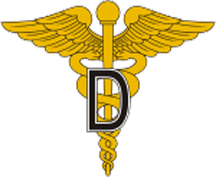Army Medical Department (United States)
Medical branch of the United States Army
The Army Medical Department (AMEDD) is a critical component of the United States Army, responsible for providing medical services to soldiers and their families. It encompasses a wide range of medical disciplines and specialties, ensuring comprehensive healthcare support in both peacetime and wartime.
History[edit | edit source]
The origins of the Army Medical Department can be traced back to the American Revolutionary War, when the need for organized medical care for soldiers became apparent. The department was formally established on July 27, 1775, by the Continental Congress, making it one of the oldest components of the United States Army.
Throughout its history, the AMEDD has evolved to meet the changing needs of the military. During the Civil War, the department expanded significantly, introducing new medical practices and technologies. The establishment of the Army Nurse Corps in 1901 and the Army Dental Corps in 1911 further enhanced its capabilities.
Structure[edit | edit source]
The Army Medical Department is organized into several corps, each specializing in different aspects of medical care:
Army Medical Corps[edit | edit source]
The Army Medical Corps is responsible for providing medical care to soldiers and their families. It includes physicians, surgeons, and other medical professionals who deliver a wide range of healthcare services.
Army Nurse Corps[edit | edit source]
The Army Nurse Corps provides nursing care to soldiers and their families. Nurses in this corps are trained to work in various settings, including hospitals, clinics, and field environments.
Army Dental Corps[edit | edit source]
The Army Dental Corps focuses on dental care and oral health for soldiers. Dentists in this corps provide preventive and restorative dental services.
Army Veterinary Corps[edit | edit source]
The Army Veterinary Corps is responsible for animal health and food safety. Veterinarians in this corps care for military working animals and ensure the safety of food supplies.
Roles and Responsibilities[edit | edit source]
The primary mission of the Army Medical Department is to ensure the health and readiness of the Army. This includes:
- Providing medical care to soldiers, retirees, and their families.
- Conducting medical research to improve healthcare outcomes.
- Training medical personnel to operate in diverse environments.
- Supporting humanitarian missions and disaster relief efforts.
Training and Education[edit | edit source]
The AMEDD provides extensive training and education programs for its personnel. This includes initial training for new recruits, as well as ongoing professional development opportunities. The department operates several medical training facilities, including the AMEDD Center and School at Fort Sam Houston, Texas.
Related pages[edit | edit source]
Transform your life with W8MD's budget GLP1 injections from $125
W8MD offers a medical weight loss program NYC and a clinic to lose weight in Philadelphia. Our W8MD's physician supervised medical weight loss centers in NYC provides expert medical guidance, and offers telemedicine options for convenience.
Why choose W8MD?
- Comprehensive care with FDA-approved weight loss medications including:
- loss injections in NYC both generic and brand names:
- weight loss medications including Phentermine, Qsymia, Diethylpropion etc.
- Accept most insurances for visits or discounted self pay cost.
- Generic weight loss injections starting from just $125.00 for the starting dose
- In person weight loss NYC and telemedicine medical weight loss options in New York city available
- Budget GLP1 weight loss injections in NYC starting from $125.00 biweekly with insurance!
Book Your Appointment
Start your NYC weight loss journey today at our NYC medical weight loss, and Philadelphia medical weight loss Call (718)946-5500 for NY and 215 676 2334 for PA
Search WikiMD
Ad.Tired of being Overweight? Try W8MD's NYC physician weight loss.
Semaglutide (Ozempic / Wegovy and Tirzepatide (Mounjaro / Zepbound) available. Call 718 946 5500.
Advertise on WikiMD
|
WikiMD's Wellness Encyclopedia |
| Let Food Be Thy Medicine Medicine Thy Food - Hippocrates |
Translate this page: - East Asian
中文,
日本,
한국어,
South Asian
हिन्दी,
தமிழ்,
తెలుగు,
Urdu,
ಕನ್ನಡ,
Southeast Asian
Indonesian,
Vietnamese,
Thai,
မြန်မာဘာသာ,
বাংলা
European
español,
Deutsch,
français,
Greek,
português do Brasil,
polski,
română,
русский,
Nederlands,
norsk,
svenska,
suomi,
Italian
Middle Eastern & African
عربى,
Turkish,
Persian,
Hebrew,
Afrikaans,
isiZulu,
Kiswahili,
Other
Bulgarian,
Hungarian,
Czech,
Swedish,
മലയാളം,
मराठी,
ਪੰਜਾਬੀ,
ગુજરાતી,
Portuguese,
Ukrainian
Medical Disclaimer: WikiMD is not a substitute for professional medical advice. The information on WikiMD is provided as an information resource only, may be incorrect, outdated or misleading, and is not to be used or relied on for any diagnostic or treatment purposes. Please consult your health care provider before making any healthcare decisions or for guidance about a specific medical condition. WikiMD expressly disclaims responsibility, and shall have no liability, for any damages, loss, injury, or liability whatsoever suffered as a result of your reliance on the information contained in this site. By visiting this site you agree to the foregoing terms and conditions, which may from time to time be changed or supplemented by WikiMD. If you do not agree to the foregoing terms and conditions, you should not enter or use this site. See full disclaimer.
Credits:Most images are courtesy of Wikimedia commons, and templates, categories Wikipedia, licensed under CC BY SA or similar.
Contributors: Prab R. Tumpati, MD







